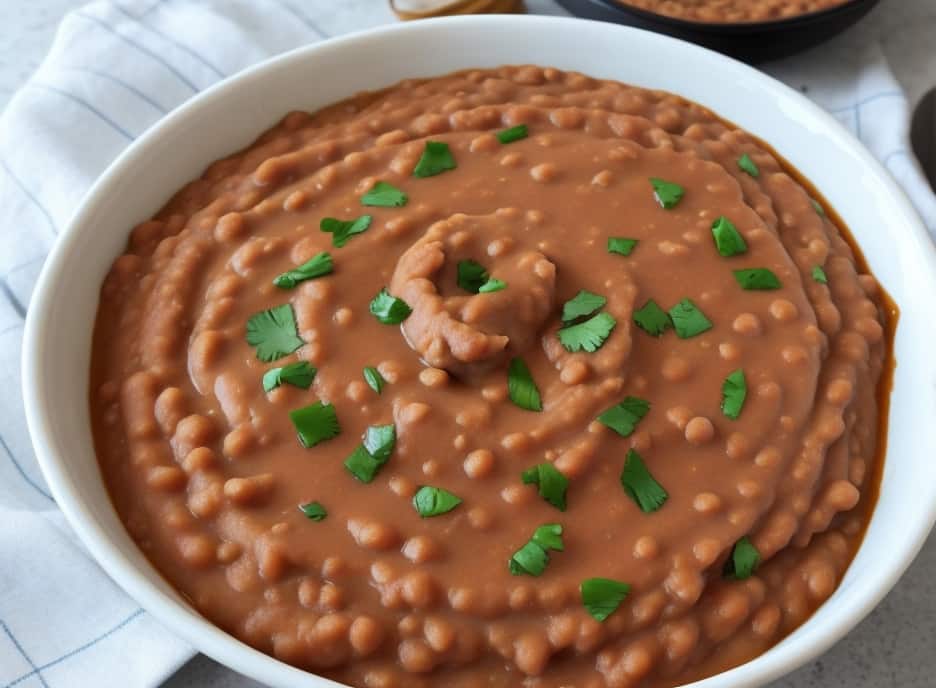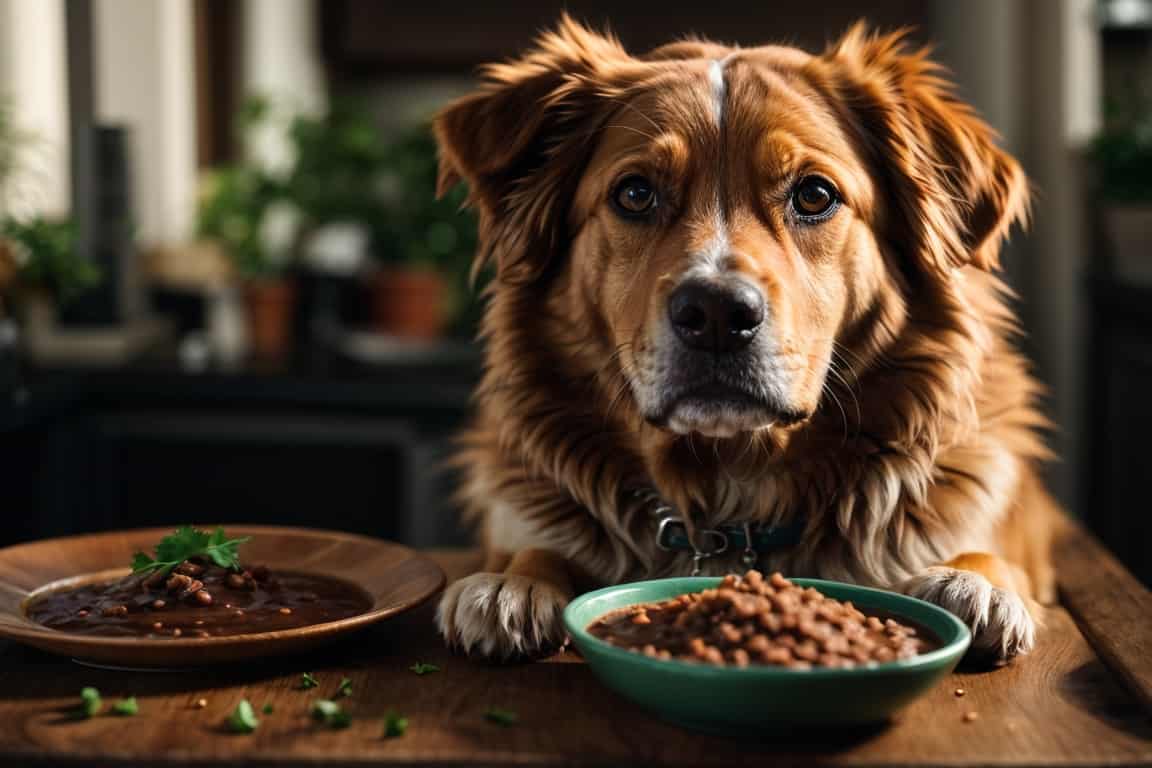As a devoted dog owner, I know that you want nothing but the best for your furry friend, including providing them with tasty treats.
If you’ve ever been enjoying some refried beans and wondered, “Can dogs eat refried beans?”, then you’ve come to the right place.
In this article, we’ll dive into this culinary conundrum.
We will explore the refried beans’ ingredients, the potential health hazards, safer alternatives, preparing beans for them, portion control when to seek veterinary help, and more.
Table of Contents
The Controversy: Can Dogs Eat Refried Beans?
Refried beans can be found in almost all households. They are loved for their rich and savory taste. However, when it comes to dogs, things may be different.
So, first, let’s address the question, “Can dogs have refried beans?” The short answer is it depends. While refried beans might seem like a wholesome treat, many things should be considered. One of which is the ingredients.
What’s in Refried Beans?
Refried beans are typically made from pinto beans. They are then mashed and cooked with various ingredients, making a creamy texture and delicious flavor.
Nevertheless, like any other food, ingredients are vital to help us know whether refried beans for dogs are harmless or not. Thus, some ingredients are divided into “primary” and “additional ingredients” categories.

Primary Ingredients
Primary ingredients are the ones that are naturally found in refried beans. Below are the primary ingredients of such a treat:
- Proteins
- Fats
- Carbs
- Vitamins
- Minerals
These ingredients were further divided into two categories: Macronutrients and Micronutrients.
Macronutrients: Proteins, Fats, and Carbs
Refried beans typically contain proteins, fats, and carbohydrates. These three work together. Yet they have different functions:
- Proteins are essential for muscle health.
- Fats provide energy.
- Carbs offer a source of vitality.
Micronutrients: Vitamins and Minerals
Refried beans also house an array of vitamins and minerals. These micronutrients are vital for various bodily functions. As such, calcium supports bone health. Meanwhile, vitamin A is responsible for cell growth.
Folate, iron, and magnesium are also present in refried beans. These nutrients are beneficial for your dog’s overall health. However, keep in mind that humans and dogs have different nutritional needs.
Additional Spices and Flavors
Depending on how Refried beans are prepared, they often come dressed up with various spices and flavors. These can add complexity to their nutritional profile. Thus, a human’s palate may dance with joy.
Some of the refried beans’ featured added ingredients include:
- Cumin
- Chili powder
- Garlic
- Onion
However, remember that while these make the treat more appealing to humans, such spices may not always sit well with dogs with sensitive stomachs.
You might probably be wondering, “Are refried beans bad for dogs?” The answer is still it can be. So, let us explore the possible hazards it can bring to your dog.
Health Hazards: What Could Go Wrong?
The following are some potential pitfalls of feeding refried beans to your dog.
Gastrointestinal Upsets
One common issue dogs may face after consuming refried beans is gastrointestinal upset. This can include the following:
- Gas
- Diarrhea
- Stomach cramps
Some other stomach discomfort should also be noted and reported to the vet for treatment.
Sodium Overload
Refried beans are often quite salty, especially the canned ones. A high amount of salt can lead to sodium overload. When this happens, it may lead to high blood pressure.
In the worst scenario, it can result in sodium ion poisoning in dogs. It may also lead to increased thirst and urination or kidney problems.
Furthermore, poisoning can manifest through the following symptoms:
- Vomiting
- Diarrhea
- Tremors
- seizures
Pancreatic Issues
Remember the fats ingredients of refried beans? The high-fat content of such a treat can stress your dog’s pancreas. If left unattended, it can lead to pancreatitis. It is a painful and potentially life-threatening condition for your friend.
Allergic Reactions
Depending on how refried beans were prepared, the spices and seasonings included in some refried beans, such as garlic and onion, can trigger allergies in sensitive dogs.
To prevent the extreme effects of allergies and treat the early signs and symptoms, watch out if your dog experiences the following:
- Itching
- Swelling
- Excessive licking.
- Vomiting
- Diarrhea
- Lethargy
Safer Alternatives: What Other Beans Can Dogs Eat?
If you’re still keen on sharing beans with your dog, you’re fortunate because some alternatives are available. The following are some safer alternatives you can serve as your dog’s treat.
Garbanzo Beans
Garbanzo beans, also known as chickpeas, belong to the legumes family. They are packed with protein and fiber. They can be an excellent, wholesome doggie snack when served plain and cooked well.
Black Beans
Like garbanzo beans, black beans are also rich in protein and fiber. Thus, they are also a nutritious choice dog treat. Prepare them as plain as possible and well-cooked as well.
Green Beans
Green beans are ideal for dogs, especially if you want them to maintain their average waistlines. They come with low levels of calories and high levels of fiber.
DIY: Preparing Beans Safely for Dogs
If you decide to share beans with your dog, it’s essential to prepare them with safety precautions. Here are simple tips and guidelines you may follow.
Cooking Techniques
Keep the food simple. Feel free to boil, steam, or bake the beans thoroughly to soften them. These cooking methods also retain the beans’ nutritional value while removing potentially harmful compounds.
Of course, you must not add spice, including garlic and onion, as they contain toxic substances for your dog. Additionally, avoid putting salt or oil on them.
Ingredient Selection
Beans themselves already contain their natural ingredients. The last and best thing you can do is opt for high-quality, fresh beans.
To do this, avoid canned varieties. They often contain excessive salt and some other unhealthy additives to preserve the beans. Additionally, steer clear of any toxic ingredients like garlic and onions.
Portion Control and Moderation
Keep in mind that portion control is the key to moderation. Meanwhile, moderation is the key to treats for your furry companion. When giving them the treat, be mindful of their size and how frequently you give them something to eat.
Small Dogs vs. Large Dogs
First, When feeding beans to your dog, size matters. Therefore, always match the portion size of treats to your dog’s size. The smaller the dogs, the smaller your servings to avoid digestive issues.
Frequency of Feeding
Treats like beans should only be given in occasional indulgence. It is different from the recommended food to become a part of their daily diet.
When to Visit the Vet
Despite your best efforts, sometimes things can go awry. Knowing when to seek veterinary help is essential to avoid shortening the life of your pet.

Symptoms to Watch For
To know whether you should bring your best friend to a veterinarian, keep an eye out for the following symptoms:
- Vomiting
- Diarrhea
- Abdominal pain
- Lethargy
- Seizures and/or tremors
If you notice any other unusual behavior besides what was mentioned, especially after your dog consumes beans, it is also best to bring them to the vet.
Immediate Steps to Take
If you suspect your dog is experiencing health issues due to bean consumption, don’t hesitate to contact your veterinarian promptly for guidance.
Meanwhile, encourage your dog to drink water if the vet is unavailable. This will help them release the toxic substances that they possibly consumed.
However, do not use water as a replacement for professional guidance. It is always better to be safe than sorry.
Conclusion
So, are refried beans suitable for dogs? If you are still planning to prepare some refried beans for dogs, remember that these may not be the safest bet due to potential health hazards.
However, there are plenty of alternative beans you can serve to them.
FAQ
What About Other Bean Varieties Like Lentils or Kidney Beans?
Like other beans, lentils can be nutritious for dogs, but only plain and well-cooked. Just make sure not to add harmful seasonings or spices that may harm them.
Meanwhile, other beans, like kidney beans, can be toxic. It’s best to consult your veterinarian before introducing any new bean variety into your dog’s diet.
What If My Dog Accidentally Consumed Refried Beans?
Monitor them and bring them to the vet when adverse reactions occur. If no immediate adverse reactions are observed, watch out closely for digestive issues.
What happens if dogs eat refried beans?
Dogs eating refried beans may experience gastrointestinal upset, sodium overload, pancreatic issues, or allergic reactions. It’s best to avoid feeding them with such to prevent these potential issues.
What beans can dogs not eat?
Dogs should not eat raw beans. These beans contain lectins that can be toxic when uncooked. Avoid beans with added salt, spices, or oil as well. These can be harmful to them because their body cannot tolerate them.
Can dogs with dietary restrictions or allergies have refried beans?
It is best to avoid giving refried beans to dogs with specific dietary restrictions or allergies. These contain ingredients that can often trigger allergies or exacerbate existing health issues.
Can puppies eat refried beans?
Puppies have more delicate digestive systems. Introducing rich or spicy foods like refried beans can lead to extreme digestive upset. It’s advisable to wait until your puppy is older and their digestive system is more mature before considering beans as a treat.

